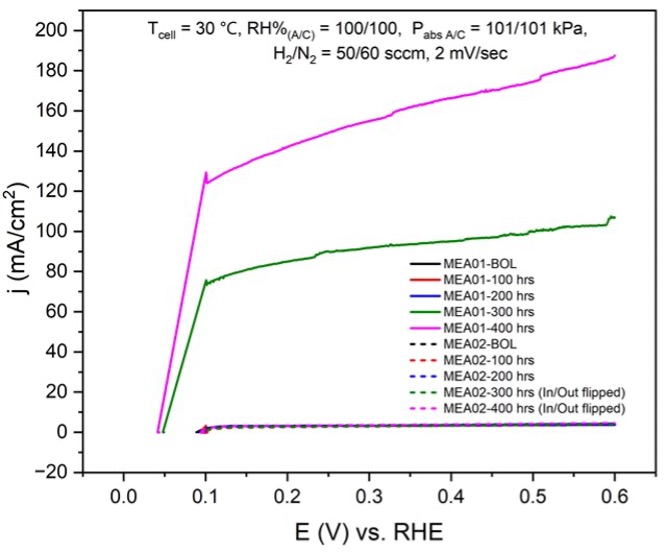Reduction in the Instability of Hydrogen Fuel Cell Platinum Catalyst
The Problem
Industries like heavy-duty transportation, for which fuel cell electric vehicles provide inherent advantages over battery electric vehicles due to high weight and energy requirements, often utilize hydrogen polymer electrolyte fuel cells (H2-PEFCs). Such H2-PEFCs often utilize platinum catalysts to catalyze redox reactions at the fuel cell cathode, but platinum group metals are unstable for long cycling operations and lose the ability to catalyze redox reactions effectively after >100k cycles/
The Solution
Researchers at the University of Tennessee have developed a method to extend the lifetime of PEFCs by between 50 and 200% in vehicle applications. The method does so by implementing a novel "load sharing" approach between the air and hydrogen sides of the fuel cell to balance out relative levels of catalyst degradation and extend the operational lifetime of the cell.


Benefits
| Benefit |
|---|
| Will result in between 50% and 200% extended operational lifetime of the fuel cell in vehicle applications. |
| Negligible change in open circuit voltage after 400 hours of operation (147mV improvement over traditional design). |
| Negligible voltage crossover increase after 400 hours of operation (155 mA/cm^2 improvement over traditional design). |
More Information
- Gregory Sechrist
- Technology Manager
- 865-974-1882 | gsechris@tennessee.edu
- UTRF Reference ID: 24037
- Patent Status:

Innovators
Preetam Sharma

Post-Doctoral Research Assistant, Electrochemical Energy Storage and Conversion Laboratory, Department of Mechanical, Aerospace, and Biomedical Engineering
Preetam Sharma is a Graduate Teaching Assistant in the Tickle College of Engineering and a member of the Electrochemical Energy Storage and Conversation Laboratory. He won Best Oral Presentation award at the 2022 Grand Renewable Energy conference.
Read more about Preetam SharmaMatthew Mench

Director, Electrochemical Energy Storage and Conversion Laboratory; Dean and Chancellor's Professor, Tickle College of Engineering
Dr. Mench received his Ph.D. in Mechanical Engineering from Pennsylvania State University in 2000. He serves as the Dean for the Tickle College of Engineering. Dr. Mench serves as the director for the Electrochemical Energy Storage and Conservation Laboratory at the College (EESC).
Read more about Matthew MenchDoug Aaron

Research Assistant Professor, Electrochemical Energy Storage and Conversion Laboratory; Assistant Department Head, Department of Mechanical, Aerospace, and Biomedical Engineering
Dr. Aaron received his Ph.D. from Georgia Institute of Technology in 2010, and serves as the assistant department head for MABE at UT and serves on the research staff of the EESC laboratory.
Read more about Doug Aaron